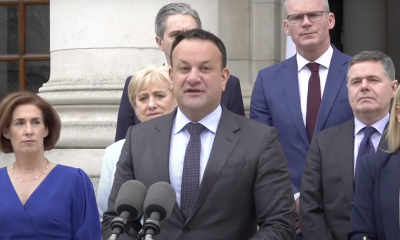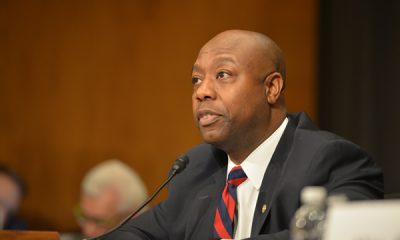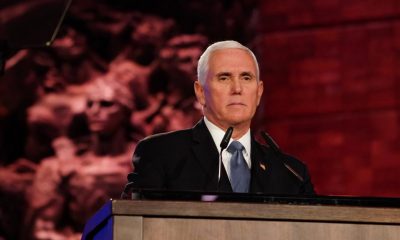Arts & Entertainment
Canadian figure skater Eric Radford says he’s ‘lucky’ he’s not Adam Rippon
the out athlete has received messages from closeted men inspired by his story
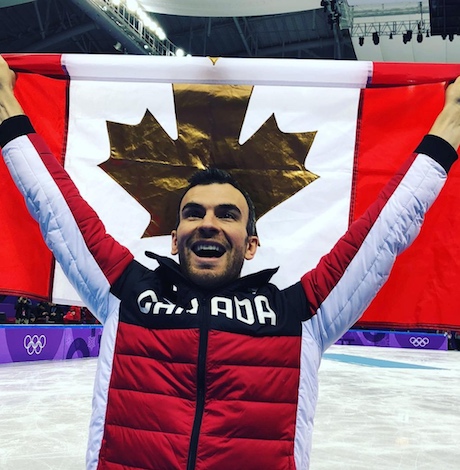
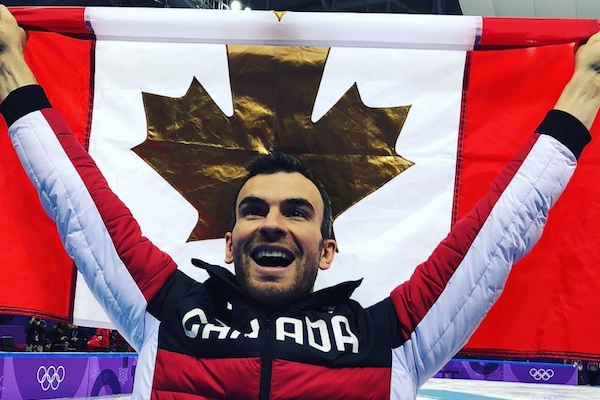
Eric Radford (Photo courtesy of Instagram)
Canadian figure skater Eric Radford is sympathizing with Adam Rippon’s feud with Vice President Mike Pence.
In an interview with TMZ, Radford notes that he’s “lucky” he has a more accepting political atmosphere compared to Rippon. Radford says Prime Minister Justin Trudeau even personally called himself and his figure skating partner Meagan Duhamel.
“I feel very lucky that I’m not Adam and I don’t have to deal with that whole political side of things. Since I won my gold medal I got a call from our prime minister and he tweeted Meagan and I on our individual and bronze medal. He’s been so supportive and kind and nice,” Radford says.
Radford, who announced he will now retire, went on to say that closeted gay men have reached out to him to share that his Olympic story has inspired them.
“I give all of my support to Adam and everything that he’s doing. I’ve gotten some really touching messages from other men who aren’t out and have told me that just hearing my story has helped make them feel a little better and has helped support them in a small way,” Radford says.
Watch below.
Arts & Entertainment
Intuitive Shana gives us her hot take for July’s tarot reading
Our tarot reader tells us what we needed to hear as we wrap up Pride month and enter July

July is here, we are in the throes of summer and we are swimming in the mingling energy of chaos, sex, personal power.
July may be a lot of things and with the way this year is going, I can promise you it is. It is definitely a month steeped in passion, romance and sex. For those of you in relationships, you will find the heat and sense of adventure turning up in the bedroom. Now would be the time to reevaluate your wants, needs and boundaries and to articulate them in a way that is clear and comfortable. Your partner may be booming in the bedroom, but sometimes all that passion drowns out common sense and we don’t need boundaries trampled or feelings hurt. So use your words and you will receive fantasy-like pleasure.
For the folks that aren’t coupled up, the Universe is asking for your heart’s desire. Do you want a relationship, a bed fellow, or a sugar daddy? There are no wrong answers and all of it is on the menu.
My warning to you is: be very clear and very careful what you wish for. The Universe has jokes that no one thinks is funny. You don’t want your love life to be the butt of a cosmic joke. Whisper your desire to the full moon while burning rose incense, carry Rose Quartz with you, or do a full on Come-To-Me spell. The magical choice is yours, just make sure you have written down your desires and requirements before wishing your next person of interest into existence.
June showed us the power and strength of the Los Angeles community as a whole. Pride brought the queer community together in celebration, visibility, authenticity, love and our ongoing fight for equality.
We took that energy from the Pride parades and marches to the streets of DTLA and all over the greater L.A. area to protest the U.S. Immigration and Customs Enforcement (ICE) raids and show up for the ‘No Kings Day’ protests on Saturday, June 14. We came together to lend our voices to larger causes and in return we see where our voices and energy landed and made its impact.
The message for July is to remember the camaraderie and chaos that we collectively produced and experienced during Pride month and see how that energy can be further harnessed to care for and protect our community in other moments. We are being told to remember in what ways we can hold space and care for ourselves and others around us and the importance in even the smallest act of love and defiance. Find your place within your community and hold strong to it.
Lend your energy, power and love to your cause and to those around you that are looking for your support this month. These acts don’t have to be huge. Sometimes a late night phone call or brunch with inspired, like-minded babes is a radical action. Lean on to the magical help of a High John root tucked into your bag or pocket to help give you strength even when you feel like you are facing the impossible, or dab some Dragon’s Blood oil on your pulse points to help put some fire in your roar.
Our closing message for the month of July is to slow down and not over think.
The world may be going crazy right now but the planets are shifting into a space to allow things in your personal world to look up. This leaves a lot of room to over think the potential political gloom we are all swimming in or to get lost in the manic clouds of new love and artistic projects. Try and set aside time daily, even if it is only 10 minutes, to be present minded and detach from the wonderland that is your internal dialog. When we begin to silence our minds we are able to let our spirit and body connect in a way that is rare during the busy times of our lives.
Books
Two new books on dining out LGBTQ-style
Visit nightclubs, hamburger joints, and a bathhouse that feeds customers

‘What is Queer Food? How We Served a Revolution’
By John Birdsall
c.2025, W.W. Norton
$29.99/304 pages
‘Dining Out: First Dates, Defiant Nights, and Last Call Disco Fries at America’s Gay Restaurants’
By Erik Piepenburg
c.2025, Grand Central
$30/352 pages
You thought a long time about who sits where.
Compatibility is key for a good dinner party, so place cards were the first consideration; you have at least one left-hander on your guest list, and you figured his comfort into your seating chart. You want the conversation to flow, which is music to your ears. And you did a good job but, as you’ll see with these two great books on dining LGBTQ-style, it’s sometimes not who sits where, but whose recipes were used.
When you first pick up “What is Queer Food?” by John Birdsall, you might miss the subtitle: “How We Served a Revolution.” It’s that second part that’s important.

Starting with a basic gay and lesbian history of America, Birdsall shows how influential and (in)famous 20th century queer folk set aside the cruelty and discrimination they received, in order to live their lives. They couldn’t speak about those things, he says, but they “sat down together” and they ate.
That suggested “a queer common purpose,” says Birdsall. “This is how who we are, dahling, This is how we feed our own. This is how we stay alive.”
Readers who love to cook, bake or entertain, collect cookbooks, or use a fork will want this book. Its stories are nicely served, they’re addicting, and they may send you in search of cookbooks you didn’t know existed.
Sometimes, though, you don’t want to be stuck in the kitchen, you want someone else to bring the grub. “Dining Out” by Erik Piepenburg is an often-nostalgic, lively look at LGBTQ-friendly places to grab a meal – both now and in the past.

In his introduction, Piepenburg admits that he’s a journalist, “not a historian or an academic,” which colors this book, but not negatively. Indeed, his journeys to “gay restaurants” – even his generous and wide-ranging definitions of the term – happily influence how he presents his narrative about eateries and other establishments that have fed protesters, nourished budding romances, and offered audacious inclusion.
Here, there are modern tales of drag lunches and lesbian-friendly automats that offered “cheap food” nearly a century ago. You’ll visit nightclubs, hamburger joints, and a bathhouse that feeds customers on holidays. Stepping back, you’ll read about AIDS activism at gay-friendly establishments, and mostly gay neighborhood watering holes. Go underground at a basement bar; keep tripping and meet proprietors, managers, customers and performers. Then take a peek into the future, as Piepenburg sees it.
The locales profiled in “Dining Out” may surprise you because of where they can be found; some of the hot-spots practically beg for a road trip.
After reading this book, you’ll feel welcome at any of them.
If these books don’t shed enough light on queer food, then head to your favorite bookstore or library and ask for help finding more. The booksellers and librarians there will put cookbooks and history books directly in your hands, and they’ll help you find more on the history and culture of the food you eat. Grab them and you’ll agree, they’re pretty tasty reads.
The Blade may receive commissions from qualifying purchases made via this post.
a&e features
Latina Turner comes to Bring It To Brunch
This fiery Latina drag queen is making her debut at Bring it to Brunch
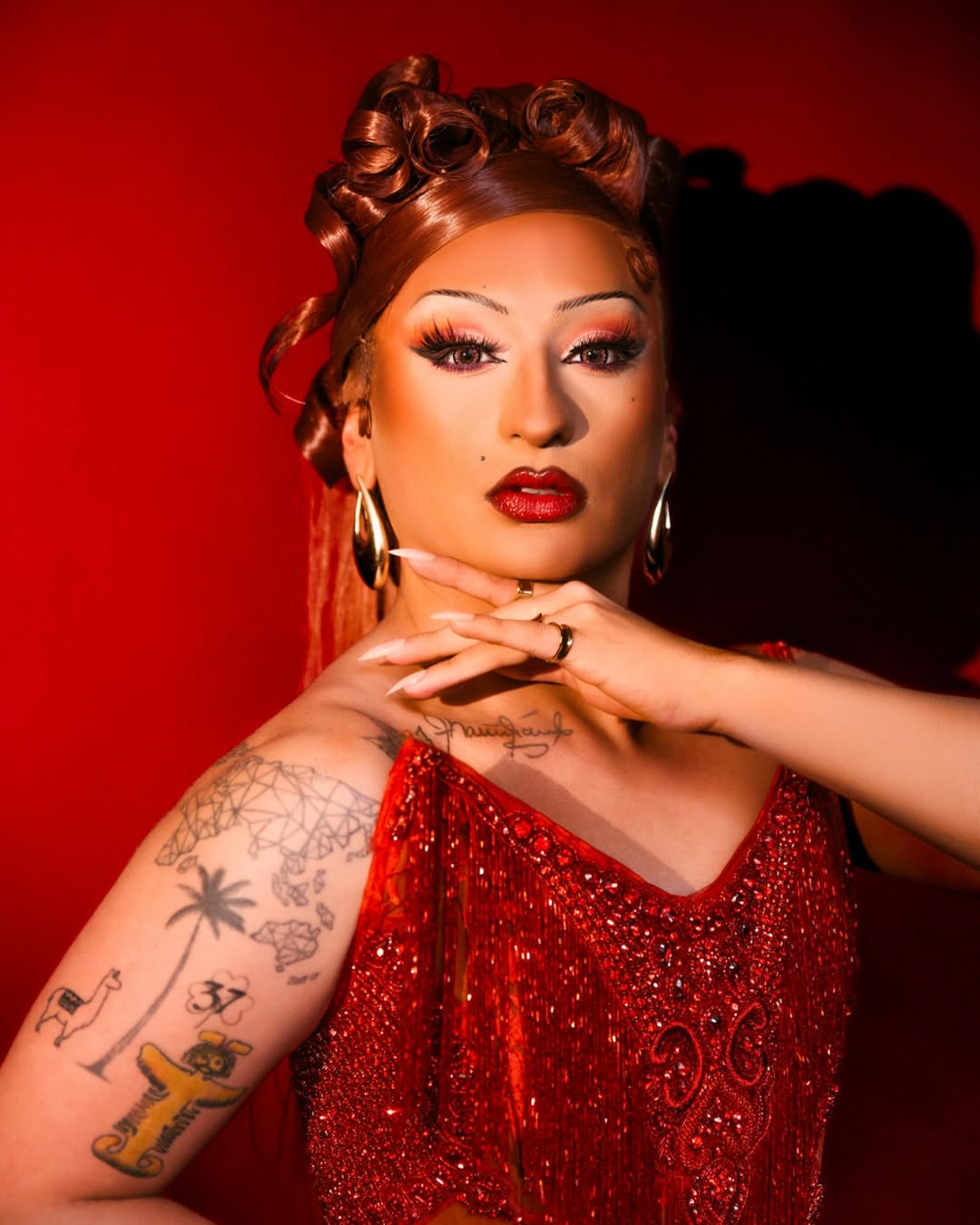
Get ready West Hollywood. There’s a Colombian heat wave about to hit this weekend. Latina Turner will join the cast of Rocco’s Bring It To Brunch hosted by Cake Moss, this Saturday at 1 p.m. Los Angeles Blade is a proud media sponsor for this fab brunch.
Latina Turner has been doing drag for more than a hot minute and she’s performed all over the nation, bringing her signature humor and killer looks everywhere she goes. We chatted with Turner as she applied her lashes and sipped a cocktail.
What was your first exposure to drag?
My first exposure to drag was when I was 18. I was in Atlanta where I saw Stars of The Century, [which is] the premier, all Black drag show of the South.
How did you come up with your drag name?
My drag name is an homage to my Latin culture and one of my favorite queens Tina Turner, but also to my sense of humor—very tongue-in-cheek, if you will.
What was your first professional gig, how did it go?
My first professional gig was actually for a car commercial. I had been doing drag for 15 minutes, but they had me listed as “real drag queen.” I said if it was real enough for them, it’s real enough for me. I got to test drive a brand new car in full drag and thank god I had that wig pinned in. My lashes were gone with the wind, earrings flew off, but the wig was on.
What sets your drag apart from other queens?
Drag is all about self-expression and artistry. As an artist and creative, my drag is about the delusion of the illusion. In my mind, I could walk down Santa Monica Blvd and not be clocked, but when I perform, it’s about the theatrics and the humor. I also learned to really connect with my audience, something I don’t see too often done. I also bring my Colombian roots and American South upbringing into my character. I think being a first generation, [we] are exposed to two different cultures that don’t normally intersect and the humor from both languages is so…ME!
What do you love most about the drag culture in Los Angeles?
The queer culture of L.A. has always been about resilience from the original gay rights riots at the Black Cat in Silverlake, to the [U.S. Customs and Immigration Enforcement] (ICE) protests. Drag queen culture isn’t just about the aesthetic and performance style, but also about community and attitude. WeHo queens have this hard work and constant hustle about them, DTLA queens are some of the most creative and entertaining queens and the Eastside queens are some of the most beautiful and hardworking entertainers in the business. No matter what the zip code is, L.A.’s queens and kings have an innate love and passion for performance and to grow as artists and the community really allows you to grow and explore your art.
How can the gay community best support our drag community?
The gay community really needs to understand that drag queens are written in the D.N.A of ALL of gay culture. We as drag queens are under so much pressure to look a certain way and though Drag Race has given the art of drag an incredible amount of visibility, not all drag is “Drag Race” drag. I need you to think of a time when you needed that extra bit of support, whether it was at a bar and wanting to talk to someone, show that same love to these queens. Tip them, share their art and continue to uplift them. Without the drag queens—both young and old—we wouldn’t be the community we are today and we will only continue to thrive if we all rise.
What is your favorite part of doing drag?
Apart from looking fierce and making some cash money, I love the feeling of rocking a performance that you have put so much time and thought into. I think as a drag queen, we overthink some details or we do certain things just for us, so that feeling of “I killed it” is such a high.
What is your least favorite part of doing drag?
My least favorite part of drag….oooof! I think that for me, the tucking (especially tucking the right way), the shaving, and the cost. It hurts my body and my pocket! But hey, beauty is pain, and my drag is never comfortable.
What is your favorite pickup line?
One time, I went up to this guy and asked him, “Do you have any kids… would you want mine?” It was all about the eye contact and body language, LOL.
How do you unwind after a night of drag?
My favorite unwind rituals are a hot shower, a full body scrub, a good moisturizer and retinol, a glass of wine and a sativa pre-roll with my feet up in my comfiest shorts. Untucked and unbothered.
What do you think the future of drag culture looks like?
The future of drag is so exciting! I love that drag is evolving, both aesthetically and performance-wise. Please, baby queens, for the love of God, clean your lace, pluck your hair lines. Marsha didn’t throw a brick for you to look like one.
What can we expect from your appearance at Bring It To Brunch?
This is my Bring It To Brunch Debut! I’m excited to bring a fun, sexy and entertaining vibe to this show! I’m going to give you fashion, exciting and upbeat performances, [all while] smelling like a million bucks.
How has doing drag most changed your life?
I think drag has really taught me so much not just about myself but also how I want to move in the world. Drag has taught me time management, communication skills and skills that are extremely transferable and useful in my day to day job and life. I also love that my drag has taught me how to love myself. Without my drag I wouldn’t have gotten to celebrate my culture or my thick and juicy behind.
Favorite song to perform to:
My absolute favorite song to perform is either “Private Dancer” by Tina Turner or “Nasty Girl” by Inaya Day—both are such strong numbers, but so different and strong!
Craziest drag memory:
My wildest drag memory was last year! I had just performed with Kesha for WeHo Pride and was ready to hit the bars. I was in a ‘lil mall dress and pumps and this girl who had clearly been drinking all day, comes up to me at the bathroom and asks me for a tampon, LOL! I was like, girl you have to be wasted to not see this beard popping through my makeup.
What is your message to the community this Pride season?
Pride started as a riot. Pride is a constant fight and though we are so incredibly lucky to be LGBTQ and even DL in L.A., we have to continue to honor those who came before us and to create a future for those who haven’t had the same luxury of freedom and authenticity. Pride isn’t just getting with hot guys and going to parties it’s about embracing and loving those around us. So get off Grindr and get to the polls! Then you can get all the trade!
Catch Latina Turner at Bring It To Brunch, this Saturday at Rocco’s in West Hollywood.
Television
‘White Lotus,’ ‘Severance,’ ‘Andor’ lead Dorian TV Awards noms
‘Voters have a special affinity for stories of self-discovery’
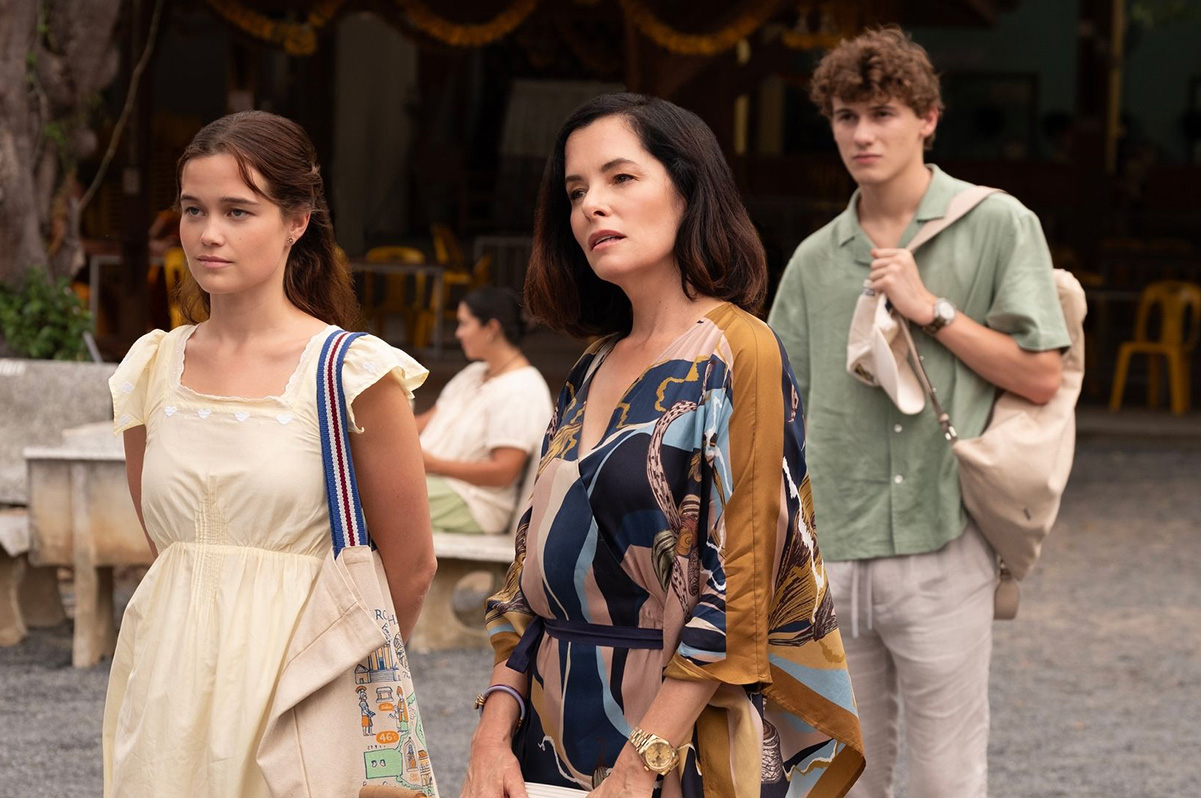
As the Academy of Television Arts and Sciences wrapped up the voting for nominations in its annual race for the Emmy Awards this week, much of Hollywood (and countless fans with favorite contenders of their own) was buzzing with speculation about who and what will be included when the final slate of nominees is announced on July 15 – but just in time for Pride Month, GALECA (The Society of LGBTQ Entertainment Critics) has stolen a bit of its thunder.
The second largest entertainment journalists group in the world, GALECA is made up of 560 members who, as the group’s press release proudly states, ”write and work for some of the most respected and buzz-worthy media outlets in the U.S. and beyond.” Last week, the organization announced its list of nominees for the 16th Annual Dorian TV Awards, representing the “queer eye’s” choices for the best in television and streaming, among both mainstream and LGBTQ content – and the list of contenders includes an exciting mix of A-listers, icons, and up-and-coming stars. This year’s performance and tribute categories – all of which are non-gendered – recognize such established talent as Beyoncé, Jean Smart, Colin Farrell, Colman Domingo, Michelle Williams, Pedro Pascal, Natasha Lyonne, Uzo Aduba, Bella Ramsey, Noah Wyle, and current flavor-of-the-day “daddy” Walton Goggins, alongside such lesser-known names as Ncuti Gatwa, Katherine LaNasa, Owen Cooper, and (as GALECA puts it) “the actress who simply calls herself Holmes.”
For those unfamiliar with GALECA, it’s not just an organization that gets together to give out awards – though it presents Dorians for film, television, and theater at separate times during the year, its stated mission is to “remind society that the world values the informed LGBTQ perspective on all things entertainment.” A nonprofit organization, they advocate for better pay, access, and respect for entertainment journalists (especially from underrepresented demographics), and provide scholarships for LGBTQ journalism students.
As for this year’s nominated shows, there’s an equally exciting mix of competitors. In the Best Drama categories, three critical and popular hits – the surreal and unpredictable Apple TV+ office drama “Severance,” the unabashedly anti-fascist and queer-inclusive Disney Plus “Star Wars” prequel series “Andor,” and HBO/Max’s irresistibly provocative hotel drama “The White Lotus” – are in the race with six Dorian nominations each, while two others – gritty medical drama “The Pitt” and video-game-inspired sci-fi zombie saga “The Last of Us” – are close behind them with five each.
In the comedy department: HBO/Max’s “Hacks,” already a two-time Dorian winner in the Best Comedy category, leads the pack with its own six nods, and the same streamer’s upbeat dramedy “Somebody Somewhere” grabbed four, while ABC’s Abbott Elementary (another two-time winner) pulled in three. Other contenders include the colorful new Apple TV+ Hollywood satire “The Studio” and season two of “The Rehearsal,” creator-star Nathan Fielder’s hard-to-categorize HBO/Max offbeat “societal experiment” that endeavors to teach “average folks” how to deal with various wildly-hypothetical life problems.
According to GALECA Executive Director Diane Anderson-Minshall: “By loving-up series like ‘Hacks,’ ‘Somebody Somewhere,’ and even ‘The Rehearsal’ and ‘Andor’ – a sci-fi story of the beginnings of a major rebellion – Dorian Award voters once again have shown they have a special affinity for stories of self-discovery and pushing for more. Like generations of LGBTQ+ people who took on the battle for the right to be who they are, these nominated programs underscore that solidarity, morality, and justice aren’t just for superheroes, but can be found in small daily actions.”
The same empathy for underdogs can be perceived behind one of GALECA’s other awards, the unique Best Unsung Series category, which amplifies shows its members believe deserve greater attention. This year’s contenders include quirky queer creator Julio Torres’ wickedly inventive and amusingly absurd HBO satire “Fantasmas” and the final season of Paramount+’s controversial-but-popular supernatural drama “Evil,” as well as Hulu’s irreverent “English Teacher” (from queer creator/star Brian Jordan Alvarez) and Amazon Prime’s “Overcompensating,” about a former high school jock and closeted college freshman, inspired by the college experiences of creator and star, social media and internet comedian Benito Skinner, who also received a Dorian nod for his acting in the show.
Of course, there’s also a category for the Best LGBTQ Series, which singles out television content of particular relevance to queer viewers. This year, crossover titles “Hacks,” “Somebody Somewhere,” and “Overcompensating” are nominated here, too, alongside the third season of Netflix’s beloved YA romance “Heartstopper” and the campy Disney+ Marvel spinoff “Agatha All Along,” which also scored a nod in the Musical Performance category for “The Ballad of the Witch’s Road.”
Speaking of camp, the Dorians would not be complete without GALECA’s most irreverent award. In the category of Campiest TV Show, “Agatha” is (surprisingly, perhaps) not among the nominees; however, Hulu’s exceptionally queer throwback sitcom “Mid-Century Modern,” which features stars Nathan Lane, Nathan Lee Graham and Matt Bomer as three gay besties who retire to Palm Springs together most deservedly is. The show – touted as a “gay ‘Golden Girls’” – also earned a posthumous Supporting Performance nod for beloved TV and Broadway legend Linda Lavin, who passed away before the series wrapped production late in 2024. Its competitors are Peacock’s deliciously dramatic Alan Cumming-led reality show “The Traitors,” Ryan Murphy’s over-the-top seafaring medical drama “Doctor Odyssey,” the aforementioned “Overcompensating,” and MTV’s eternal GALECA darling “RuPaul’s Drag Race.”
Among other award categories: Best TV Movie or Miniseries, which includes nominees like Netflix’s “Rebel Ridge” and HBO/Max’s “The Penguin”; Best Documentary and Best LGBTQ Documentary, both of which include HBO/Max’s heartfelt “Pee-wee as Himself”; Most Visually Striking Show, which highlights the design aesthetic of shows like “Andor” and “Agatha”; and Best Animated Show, which pits longtime favorites like “The Simpsons” and “Bob’s Burgers” against newer contenders like “Harley Quinn” and “Big Mouth.”
Finally, there are also some “honorary” awards to recognize the career-long impact and influence of their winners: the Wilde “Wit” Award, the TV Icon Award, and the LGBTQIA+ TV Trailblazer Award, each of which includes a host of groundbreaking talents among its nominees.
Clearly, though the Dorians don’t get the same glam treatment as many of the industry’s more “mainstream” award ceremonies, they have the impeccable taste one naturally expects from a panel of queer experts, and chances are good that – as is often the case – their choices will serve as a preview for what happens when the Emmys finally roll out their own red carpet.
Winners will be announced Tuesday July 8 at 8am PST. A full list of nominees can be found on the Blade website.
2025 DORIAN TV AWARD NOMINATIONS—FULL LIST
BEST TV DRAMA
Andor (Disney+)
The Last of Us (HBO/Max)
The Pitt (Max)
Severance (Apple TV+)
The White Lotus (HBO/Max)
BEST TV COMEDY
Abbott Elementary (ABC)
Hacks (HBO/Max)
The Rehearsal (HBO/Max)
Somebody Somewhere (HBO/Max)
The Studio (Apple TV+)
BEST LGBTQ TV SHOW
Agatha All Along (Disney+)
Hacks (HBO/Max)
Heartstopper (Netflix)
Overcompensating (Amazon Prime)
Somebody Somewhere (HBO/Max)
BEST TV MOVIE OR MINISERIES
Adolescence (Netflix)
Bridget Jones: Mad About the Boy (Peacock)
Dying for Sex (FX on Hulu)
The Penguin (HBO/Max)
Rebel Ridge (Netflix)
BEST WRITTEN TV SHOW
Andor (Disney+)
Hacks (Max)
The Pitt (Max)
Severance (Apple TV+)
The White Lotus (HBO/Max)
BEST UNSUNG TV SHOW
English Teacher (FX on Hulu)
Evil (Paramount+)
Fantasmas (HBO/Max)
Mid-Century Modern (Hulu)
Overcompensating (Amazon Prime)
BEST NON-ENGLISH LANGUAGE TV SHOW
Threesome (ViaPlay)
My Brilliant Friend (HBO/Max)
One Hundred Years of Solitude (Netflix) (tie)
Elite (Netflix) (tie)
Pachinko (Apple TV+)
Squid Game (Netflix)
BEST LGBTQ NON-ENGLISH LANGUAGE TV SHOW
Becoming Karl Lagerfeld (Hulu)
The Boyfriend (Netflix)
Elite (Netflix)
The Secret of the River (Netflix)
When No One Sees Us (HBO/Max)
BEST TV PERFORMANCE—DRAMA
Colin Farrell, The Penguin (HBO/Max)
Stephen Graham, Adolescence (Netflix)
Cooper Koch, Monsters: The Lyle and Erik Menendez Story (Netflix)
Diego Luna, Andor (Disney+)
Cristin Milioti, The Penguin (HBO/Max)
Pedro Pascal, The Last of Us (HBO/Max)
Bella Ramsey, The Last of Us (HBO/Max)
Adam Scott, Severance (Apple TV+)
Michelle Williams, Dying for Sex (FX on Hulu)
Noah Wyle, The Pitt (HBO/Max)
BEST SUPPORTING TV PERFORMANCE—DRAMA
Owen Cooper, Adolescence (Netflix)
Carrie Coon, The White Lotus (HBO/Max)
Taylor Dearden, The Pitt (HBO/Max)
Erin Doherty, Adolescence (Netflix)
Walton Goggins, The White Lotus (HBO/Max)
Katherine LaNasa, The Pitt (HBO/Max)
Genevieve O’Reilly, Andor (Disney+)
Parker Posey, The White Lotus (HBO/Max)
Jenny Slate, Dying for Sex (FX on Hulu)
Tramell Tillman, Severance (Apple TV+)
BEST TV PERFORMANCE—COMEDY
Uzo Aduba, The Residence (Netflix)
Quinta Brunson, Abbott Elementary (ABC)
Ayo Edebiri, The Bear (FX on Hulu)
Bridget Everett, Somebody Somewhere (HBO/Max)
Nathan Fielder, The Rehearsal (HBO/Max)
Kathryn Hahn, Agatha All Along (Disney+)
Natasha Lyonne, Poker Face (Peacock)
Seth Rogen, The Studio (Apple TV+)
Benito Skinner, Overcompensating (Amazon Prime)
Jean Smart, Hacks (HBO/Max)
BEST SUPPORTING TV PERFORMANCE—COMEDY
Ike Barinholtz, The Studio (Apple TV+)
Colman Domingo, The Four Seasons (Netflix)
Hannah Einbinder, Hacks (HBO/Max)
Holmes, Overcompensating (Amazon Prime)
Janelle James, Abbott Elementary (ABC)
Kathryn Hahn, The Studio (Apple TV+)
Jeff Hiller, Somebody Somewhere (HBO/Max)
Linda Lavin, Mid-Century Modern (Hulu)
Catherine O’Hara, The Studio (Apple TV+)
Meg Stalter, Hacks (HBO/Max)
BEST TV MUSICAL PERFORMANCE
Beyoncé, “Cowboy Carter” medley, Ravens vs. Texans Halftime Show (Netflix)
Doechii, “Catfish” / “Denial Is a River,” 67th Annual Grammy Awards (CBS)
Cynthia Erivo, Ariana Grande, “The Wizard of Oz” / “Wicked” medley, 97th Academy Awards (ABC)
Kathryn Hahn, Patti LuPone, Ali Ahn, Sasheer Zamata, “The Ballad of the Witches’ Road,” Agatha All Along (Disney+)
Kendrick Lamar, “Squabble Up,” “Humble,” etc., Super Bowl LIX Halftime Show (Fox)
BEST TV DOCUMENTARY OR DOCUMENTARY SERIES
Deaf President Now! (Apple TV+)
Elizabeth Taylor: The Lost Tapes (Max)
Pee Wee as Himself (HBO/Max)
The Rehearsal (HBO/Max)
SNL50: Beyond Saturday Night (NBC)
BEST LGBTQ TV DOCUMENTARY OR DOCUMENTARY SERIES
Disco: Soundtrack of a Revolution (PBS)
Fanatical: The Catfishing of Tegan and Sara (Hulu)
Outstanding: A Comedy Revolution (Netflix)
Pee Wee as Himself (HBO/Max)
Queer Planet (Peacock)
BEST CURRENT AFFAIRS SHOW
(Talk show or news/information program)
The Daily Show (Comedy Central)
Hot Ones (YouTube)
Everybody’s Live With John Mulaney (Netflix)
Late Night with Seth Meyers (NBC)
Last Week Tonight with John Oliver (HBO/Max)
BEST REALITY SHOW
The Amazing Race (CBS)
The Great British Baking Show (Netflix)
RuPaul’s Drag Race (MTV)
Top Chef (Bravo)
The Traitors (Peacock)
BEST GENRE TV SHOW
Agatha All Along (Disney+)
Andor (Disney+)
Black Mirror (Netflix)
The Last of Us (HBO/Max)
Severance (Apple TV+)
BEST ANIMATED SHOW
Big Mouth (Netflix)
Bob’s Burgers (Fox)
Harley Quinn (HBO/Max)
The Simpsons (Fox)
Star Trek: Lower Decks (Paramount+)
MOST VISUALLY STRIKING TV SHOW
Adolescence (Netflix)
Agatha All Along (Disney+)
Andor (Disney+)
Severance (Apple TV+)
The White Lotus (HBO/Max)
CAMPIEST TV SHOW
Doctor Odyssey (ABC)
Mid-Century Modern (Hulu)
Overcompensating (Amazon Prime)
RuPaul’s Drag Race (MTV)
The Traitors (Peacock)
WILDE WIT AWARD
Quinta Brunson
Alan Cumming
Hannah Einbinder
Cole Escola
Nathan Fielder
GALECA TV ICON AWARD
Gillian Anderson
Angela Bassett
Alan Cumming
Sarah Michelle Gellar
Jean Smart
GALECA LGBTQIA+ TV TRAILBLAZER AWARD
Jonathan Bailey
Greg Berlanti
Ncuti Gatwa
Bella Ramsey
Mike White
Bowen Yang
Arts & Entertainment
King of Drag competition series hosts premiere party in West Hollywood
Tune in to see history in the making with TV’s first-ever drag king competition show, King of Drag every Sunday on RevryTV

“King of Drag” hosted its premiere at Beaches Tropicana in West Hollywood on Sunday, June 22, uniting kings from all across the land, far and near.
The TV reality show premiere brought in a packed house with guest appearances, famous drag kings in their full regalia and guests who were more than eager to see the first episode in the historic series.
The series was created by Damian Pelliccione and Christopher J. Rodriguez and hosted by Murray Hill, who bring together a significantly underrepresented group of performers from all across the United States for a competition show on more than just looks and their ability to beat their faces. This diverse group of kings represent various cultures, inspire different communities and bring their unique skills and personalities to compete against each other for the title of king.
And the 10 kings are:
Buck Wyld from Dallas, Texas
Alexander the Great from Austin, Texas
Perka $exxx from Charlotte, North Carolina
Pressure K from Atlanta, Georgia
Dick Von Dyke from Minneapolis, Minnesota
King Molasses from Washington D.C.
Charles Galin King from Los Angeles, California
Tuna Melt from Queens, New York
Henlo Bullfrog from Philadelphia, Pennsylvania
Big D from Bellingham, Washington
The prizes
Crown and scepter from Fierce! Drag Jewels
Custom suit courtesy of Sharpe Suiting
Talent Management from Queer Up Agency
Round-trip flight to Seattle to headline the Emerald City King’s Ball
One year’s worth of e.l.f cosmetics and e.l.f skin products
$10,000 in cash
Kings Court
The battle for king has to be judged by the first and foremost kings, queens and icons of all the land. The Kings Court was made up of Tenderoni, the Puerto Rican King of Charisma,;
Sasha Velour, Brooklyn drag icon, author of “The Big Reveal,” and winner of RuPaul’s Drag Race; Wang Newton, from New York City; legendary director Paul Feig and last, but not least, executive producer and judge of the GLAAD award-winning series “Drag Latina,” and queer style icon, Damian Pelliccione.
Episode One
The first episode’s theme was none other than: sports.
The first challenge was “The Weenie Challenge,” where contestants had to pose for player cards, with only five minutes to suit up in semi-used sports gear. The photoshoot was judged by Chicago-based king Tenderoni and WNBA all-star Layshia Clarendon.
The second challenge brought teams together to write and record a verse, while also coming up with the choreography for a performance. The teams assembled and got to planning — prizes all in mind.
Tuna Melt (Teo Pactong) became the first king to be eliminated from the competition in the series premiere episode. Pactong, who runs the Hause of Melt, a production brand — was voted off after a singing and dancing competition and sports photoshoot during the first episode.
Pactong has been doing drag for four years after being introduced to drag by their drag father Theydy Bedbug. Before doing drag, they held music industry positions at Youtube Music and Google.
In the episode, Pactong opens up about their identities.
Pactong says that in the process of finding their drag king persona Tuna Melt, they found Theo. In their cameo, they explain that when they came out as trans, they didn’t feel like they fit in the world of music tech anymore.
“For the longest time, I never felt like a girl and I also never felt a hundred percent a man,” said Pactong. “It’s always been this spectrum of existence.” When Pactong was put up for elimination, they also opened up about their family background and how that influences their passion for this competition.
“I’m Asian, I’m Latin [American], I’m transgender. I come from a family of immigrants.” they said. “My mother instilled in me that I had to work two times harder than everybody else.”
In the first round of eliminations, it was Henlo Bullfrog and Tuna Melt who ended up in the bottom two, facing off against each other in a final redemption round.
Each week the kings will fight for a last chance during “The Final Thrust” round, and this time it was a breakdancing battle.
In the end, it was Tuna Melt who was voted off by the majority of the Kings Court.
Each week, we will be interviewing the kings as they get eliminated. Stay tuned for more!
Where To Watch
King of Drag is now available to stream on RevryTV, an LGBTQ streaming platform for queer movies, TV shows, music and more — all for free. New King of Drag episodes will premiere weekly on Sundays.
Arts & Entertainment
L.A. Black Pride honors Noah’s Arc TV series with Community Legacy Award
As the show marks its 20th anniversary, it’s returning with a highly anticipated new chapter
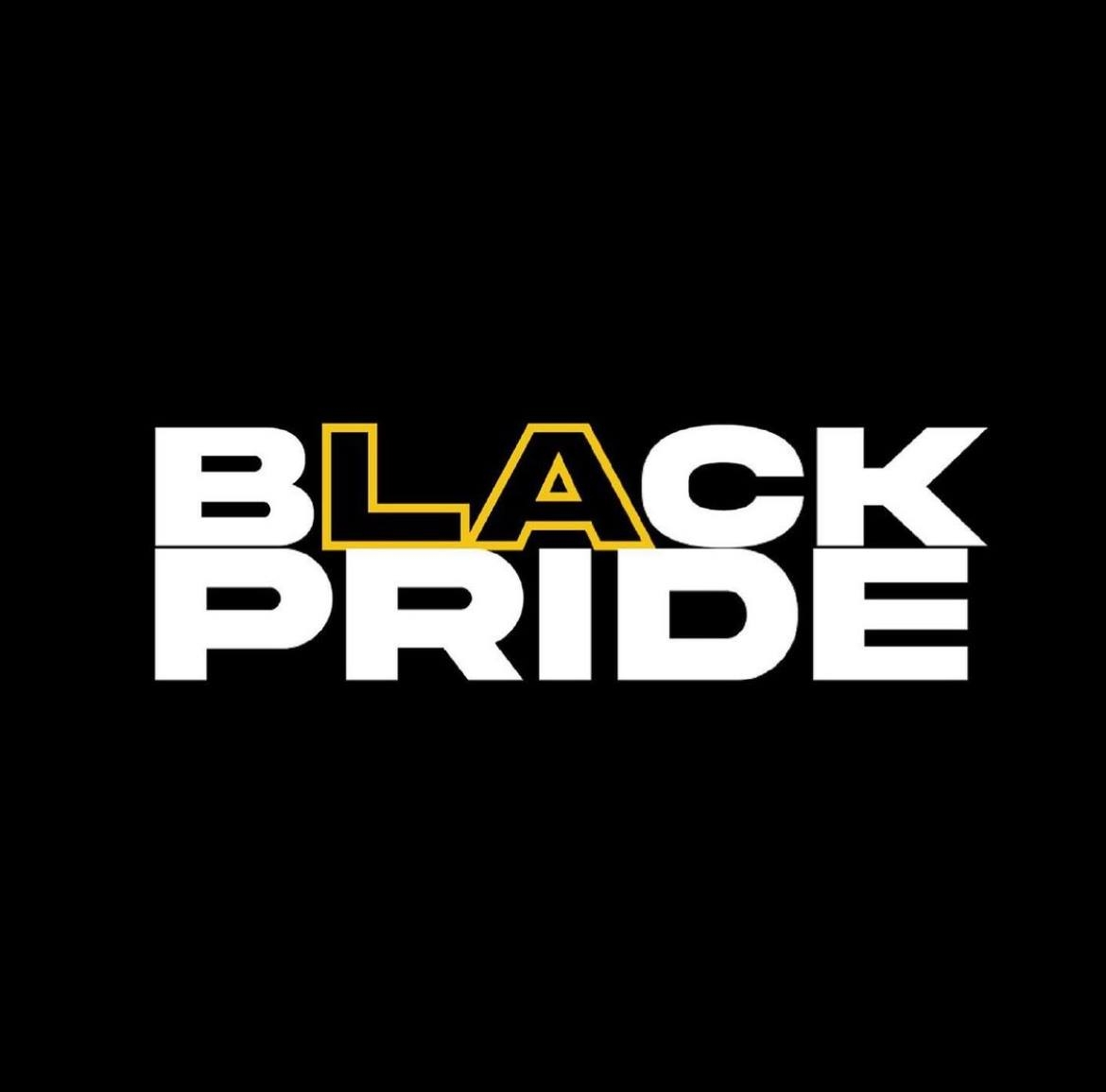
Two decades after Noah’s Arc changed the game for queer, Black storytelling in Hollywood, Patrik-Ian Polk returns to Los Angeles Black Pride for a legacy celebration honoring the sparkling new chapter in the show’s story.
Grab your popcorn…
During LABP’s finale event on Sunday, July 6 at The Abbey, the festival will present its Community Legacy Award to director, producer and trailblazing storyteller Patrik-Ian Polk. Polk is known for creating Noah’s Arc, a show that premiered 20 years ago on Logo TV — the first queer-centered commercial cable network. It’s a more-than-appropriate tribute as Polk’s iconic series helped define Black queer media and its influence remains undeniable today.
“The idea for Noah’s Arc was born over 20 years ago at the opening night party for Black gay Pride in Los Angeles,” recalled Polk. “I was struck with the idea to create a Black gay Sex and the City-type series. I literally declared to myself at that party that I was going to make it happen. I vowed that within one year the show would be a reality. And it was.”
A Polk announced that Noah’s Arc: The Movie, will debut this summer. The reunion is a nostalgic and formidable reminder of how vital Black queer storytelling remains today.
This year, LABP’s programming reflects that vision more than ever. With community panels, wellness activations, art installations and nightlife events curated specifically for Black LGBTQ audiences, the weekend is about visibility and shaping our future.
Part of this future means honoring and celebrating those pioneers who laid the groundwork.
Each summer, thousands of Black LGBTQ folks join together in Los Angeles to celebrate who we are, reclaim space, share our joy and continue to write our communal story. Over the years, LABP has evolved from a weekend of parties, into a powerful cultural movement. It serves up a dynamic blend of celebration, storytelling, wellness and activism that honors every aspect of Black queer life.
LABP is a pulsing and vibrant archive where history is not just remembered but made, where our chosen family comes together and where new generations of creatives, organizers and leaders emerge. Under the guidance of cultural producer Brandon Anthony, LABP has come to be a platform for expression and impact, holding a mic to Black and brown queer voices that are far too often left on the margins of mainstream Pride narratives.
Originally premiering in 2005, Noah’s Arc was the first scripted television series to center the lives of Black, gay men. It was groundbreaking in its portrayal of love, intimacy, vulnerability and friendship. Set against the backdrop of Los Angeles, Noah’s Arc gave us characters who felt real to those watching. For so many, it was the first time seeing themselves fully reflected in television.
“LA has always been a hub for Black queer creativity and culture,” said Polk. “But there are fewer and fewer spaces like that today and fewer events that spotlight our stories in full color. So I’m truly honored to be recognized, and I’m glad to see LA Black Pride and innovators like Brandon Anthony continuing to center and celebrate our community in meaningful ways. It is sorely needed.”
LABP’s commitment to centering and uplifting BIPOC queer narratives is genuine and intentional. As corporate Pride celebrations more often than not lose sight of grassroots needs and at times, reality, LABP’s undertaking is both critical and necessary. Here, heritage and foresight go hand in hand. Through its awards, art-centric events and community programming, LABP celebrates and sustains Black queer voices. For Brandon Anthony, who has reimagined LABP with a focus on accessibility and authenticity — the mission is clear.
“We’re creating the space we’ve always deserved. That means programming that reflects our culture, leadership that reflects our lived experiences, and events that pour back into the community.”
As Black queer youth, elders, artists, and allies come together for this year’s festivities, they do so in celebration, more importantly, in solidarity. LABP is a sanctuary, yes, but it is also a statement.
We are here. We have always been here. And our stories matter.
Polk’s recognition at LABP is a full flex in Black queer history. A show idea that started at a Pride party two decades ago is now being celebrated by the very community that inspired it. And with a new generation of storytellers ready to make their mark. Los Angeles Black Pride continues to champion voices like Polk’s while creating space for the next wave of storytellers to rise by honoring, sharing and supporting their stories. There will be music, mimosas and maybe a few tears of joy along the way.
To purchase tickets or for more information, head to http://losangelesblackpride.org/
Arts & Entertainment
Dances with Films Provide Much-Needed Representation of Queer Films at 28th Annual Festival
The 2025 outing of DWF will play a total of 254 films, with the theme “Find Your Truth,” making this is one of Los Angeles’ largest independent film festivals
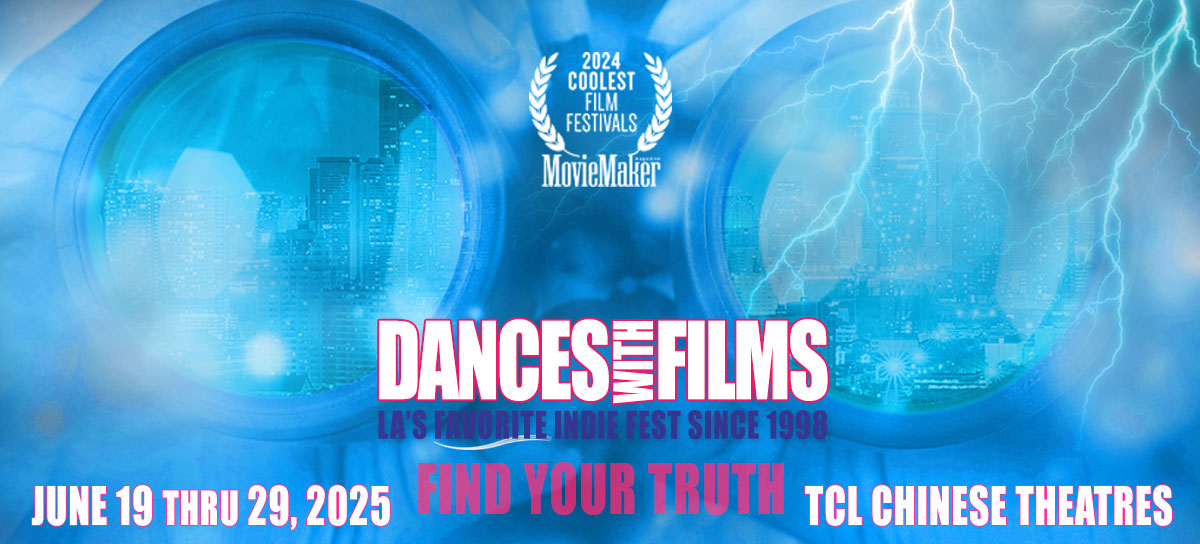
Jackie Tepper, Producing Partner and Documentary Programming Chair for the 28th annual Dances with Films Festival in Los Angeles, is thrilled to have an array of LGBTQIA+ movies and series at this year’s festival.
“We feel that it’s important for the LGBTQIA+ community to be heard, especially now given our political climate,” acknowledged Tepper. “We have always championed these projects, but even more so now. We are proud to shine a spotlight on these amazing films.”
This year, three features, eight shorts, and four pilots will play at the historic TCL Chinese Theatre from Thursday, June 19 through Sunday, June 29. The 2025 outing of DWF will play a total of 254 films, with the theme “Find Your Truth,” making it Los Angeles’ largest independent film festival. A complete list of films and events, the festival schedule, passes and tickets, and more are available online here.
The features slate begins with the World Premiere of Lane Michael Stanley’s “T” on Friday, June 20 at 7:15PM. Filmed over lead actor Mel Glickman’s real-life first year taking Testosterone, “T” is a fictionalized, never-before-seen journey of nuanced transmasculine discovery, authentically portraying the moving struggles and joys encountered in friendships, family, and romantic relationships.
“We are incredibly honored to present such a diverse queer slate each year, added DWF co-founder Michael Trent. “Pride Month is a time of celebration and visibility for the LGBTQIA+ community, and we are so proud to shine a spotlight on these exceptional filmmakers who use their voice and art to promote acceptance and understanding.”
One of the highlights of the festival is the queer comedy TV pilot, “Gasbag,” which had its World Premiere at Dances With Films NYC last December. It screens in Pilots Block 6, Saturday June 28 at 3:30PM.
“Gasbag is the epitome of the scrappy ‘can do’ spirit that Dances With Films celebrates,” said writer and producer Lynn Rosen. “I often write about subjects that mystify me as a way to understand them, and overtalkers like George Nordstrom, my lovable protagonist, fit that bill. So when Covid lockdown struck, I wrote Season 1 for a few theatre friends, including fabulous character actor and co-EP, Chad Kessler, as a way to stay connected and keep our spirits up. We shared this DIY inaugural season with friends as a way to spread the joy we felt making it. People loved George and his band of merry misfits so much we felt we had to make Season 2.”
One notable film in the feature documentary category is Chris Coats’ “FLAMINGO CAMP,” where a group of young queer and trans anarchists create a thriving safe space for themselves in the squatter town of Slab City, known as Flamingo Camp.
The shorts programming kicked off on Friday, June 20 at 4:45 PM in the Documentary Shorts Block 1 with DWF alumna Cheri Gaulke’s LA premiere of the documentary, “Old Girl In a Tutu: Susan Rennie Disrupts Art History,” in which feminist scholar Susan Rennie seizes her iPhone and sneaks her queer, octogenarian body into master works of art, disrupting the narrative of the male gaze.
Head of Narrative Short Film Programming Lindsey Smith-Sands loves the brief glimpse that short films give viewers into other people’s lives.
“One thread throughout the short films this year is finding your true self and LGBTQIA+ stories work well with those themes,” Smith-Sands noted. “The exciting shift is seeing how LGBTQIA+ characters are portrayed in many of these narratives as the confident, assured ones, whereas the other characters are still struggling with who they are.”
a&e features
Los Angeles Black Pride raises community consciousness uplifting Black, queer talent
Here is a slice of Pride rooted in ownership, not optics

When most people think of Pride they more often than not relate it to parades parties. Far too many often forget that it is also a platform. Los Angeles Black Pride (LABP) isn’t just raising the flag. They are raising community consciousness at a time when white, mainstream aesthetic often enjoys borrowing from Black, queer culture without acknowledging the appropriation at hand. LABP does the work to flip the script.
This year, the celebration takes a bold economic stance. Visibility is cute, but viability pays the bills.
BLQ+MKT: Not Your Average Pop-Up
Enter BLQ+MKT, LABP’s unapologetically Black, queer vendor marketplace that’s one part business expo, one part cultural homecoming and all of the parts hustle. It’s not just about selling candles and tees, no matter how hard those candles do slap. It’s about building an ecosystem where Black LGBTQ entrepreneurs are seen and supported. This marketplace is not a low-key side attraction — it’s the main stage for economic empowerment.
By centering queer-owned brands, LABP is addressing a long-overdue market correction. Black LGBTQ folks represent a whopping $113 billion in spending power. That’s not just an audience, it’s a full-on economy. And yet, less than 10% of advertising content reflects this reality. BLQ+MKT says what the mainstream won’t — put some respect and revenue on our names.
Lakeyah: Headliner meets head-turner
Speaking of showstoppers, LABP will feature none other than Lakeyah – rapper, baddie, and blueprint for how queer-centered entertainment can drive community dollars. Her presence isn’t just a vibe, it’s part of a larger economic strategy. When you book talent that reflects the community, you do more than just fill seats. You circulate wealth, amplify voices, and make it very clear who this party is really for. She opens for Saucy Santana at this year’s Saturday night main event.
The Business of being seen
LABP is turning Pride into praxis. By shaping spaces where artistry and ownership meet, they’re shifting the focus from being seen to being paid — and paying it forward. This is about building power without waiting around for permission. Applause is adorable. Ownership changes everything.
Come for the music, the joy, the lewks that will leave zero crumbs. And while partaking in all of the Pride, take a closer look. Every booth at BLQ+MKT, every track Lakeyah drops, carries the architecture of a future rooted in Black queer autonomy. In LABP’s world, Pride isn’t solely a performance. It’s a goddamn power move.
To purchase tickets or for more information, head to http://losangelesblackpride.org/
a&e features
On the Fringe: Branden Lee Roth takes on Hollywood

Fresh off his performance in Bat Boy: The Musical, actor Branden Lee Roth is back onstage with yet another show — this time at the Hollywood Fringe Festival in. The show is not only a cabaret-style celebration of the composer’s lesser-known works, but also an opportunity for Roth to perform his powerful vocals and emotional depth.
Tomorrow, the show will have its last two showings at the Hollywood Fringe Festival at 2p.m. and at 10p.m.
“Bat Boy was one of the most challenging [shows] I’ve done — both physically and vocally,” said Roth. The story’s message stuck with him: a character on a profound journey of acceptance and belonging. With such a demanding role — and one carrying so much emotional weight — the pressure was on for Roth to deliver. To make matters more intense, he had little time to prepare.
“I had to jump into the role with minimal rehearsal time,”said Roth. “But the cast and crew were so supportive.”
As the show concluded, he described the performance as a show that will “stay with me forever.”
Now, audiences have yet another chance to see Roth perform — this time in a completely different musical world, but one with just as much passion. Lost & Found offers a rare glimpse into the deep cuts of Frank Wildhorn, the Broadway composer behind Jekyll & Hyde and The Scarlet Pimpernel. However, audiences shouldn’t expect the usual hits.
“The music itself will be something most audiences haven’t heard,” explained Roth. “The show is set up as a cabaret-style with a full band to back it up in an amazing venue.” And it’s not just the instruments or venue that shine.
Roth describes the vocals as “pretty epic.”
Set at The Cat’s Crawl, a speakeasy-style venue, Lost & Found embraces the stripped-down intimacy of cabaret. “Each song stands alonewith no scenes in between outside of some hosting.” It is evident that the opportunity to see Lost & Found live is a chance to really live in the music. There are no flashy sets or scenes between songs — it is purely storytelling through song.
This is Roth’s first time performing in the Hollywood Fringe Festival and he is fully embracing the experience. “The Fringe is an annual celebration of theatre in Hollywood. It’s a really awesome opportunity for creatives and artists to showcase their talents,” he said.
As an openly LGBTQ artist, Roth is no stranger to the challenges of navigating identity in a sometimes rigid or problematic industry. “Being part of the LGBTQ community and being in the arts hasn’t always been an easy journey.” He explains that it took him time to feel confident —specifically when pursuing roles that might not have identified with him. However, Roth recognizes that powerful stories transcend one’s personal identity.
“I start by finding where [a character and I] are similar and build from there.”
Roth encourages folks to get their tickets with only one day left.
“I think audiences are going to really enjoy themselves and leave humming a few new songs to themselves,” he said. You can watch Lost & Found: The Unsung World of Frank Wildhorn at The Cat’s Crawl during the Hollywood Fringe Festival. Tickets are available here, and fans can use the discount code BRANDEN at checkout. To keep up with Roth’s performances, follow him on Instagram at @brandenleeroth.
a&e features
A king rises in Vico Ortiz’s new solo show
With a little bit of ‘astrology woo-woo-ness, a little bit of magic woo-woo-ness, drag and fabulosity,’ they tether together the story of the relationship between them and their mother

Nonbinary, Puerto Rican icon, comedian, actor and activist, Vico Ortiz, 33, binds and weaves awkward childhood moments, family expectations, Walter Mercado and the love of their life embodied by a household mop, to tell the story of the rise of a king.
During the peak of Pride month, Ortiz gifted the Los Angeles queer and trans communities with a spectacularly queer, solo show featuring themself in their quest of self-discovery, a profound sense of connection and reconnection with their femininity and masculinity through growing pains and moments of doubt. This is a show that Ortiz describes as “wholesome, but burlesque.”
King Vico Ortiz rises
The show, which premiered on June 12, details Ortiz’s childhood, vignetting and transforming through their most formative years and through canon events that led them to their gay awakening, such as watching Disney’s Mulan (in Spanish) and the moment Ortiz cut their hair in honor of the scene where Mulan cuts hers off. Ortiz took the audience on a journey through their inner monologue during the moments in their childhood and into adulthood, where they not only come to terms with their identity, but also learn to understand the internal battle their parents went through as they watched their king rise.
Though Ortiz mostly only acted prior to writing and producing their first solo show, they finally took their opportunity to do things a little differently. Last June, their friend Nikki Levy, who runs a show called Don’t Tell My Mother, coached Ortiz to dredge up childhood memories and tether them in a way that could be told and understood by an audience as a show about queerness and self-discovery.
“[Levy] started asking me those questions that dig deeper into the emotional journey of the story, not just ‘hehe’ ‘haha’ moments, but there’s something a little deeper happening,” said Ortiz in an interview with the L.A. Blade. This is when they asked Levy to help coach them through the process of putting the story together in a way that Ortiz imagined it, but also in a way that made sense to the audience.
Ortiz says that with a little bit of ‘astrology woo-woo-ness, a little bit of magic woo-woo-ness, drag and fabulosity,’ they tether together the story of the relationship between them and their mother.
“Astrology had a huge influence in my life growing up from the get-go,” said Ortiz. “I was born and [my mother] printed my birth chart.” The Libra sun, Sagittarius rising, Scorpio moon and Venus in Virgo, says they have always known their chart and that not only did astrology play a huge role in their life growing up, but so did astrologer-to-the-stars Walter Mercado.
The solo was partly influenced by their mother and partly influenced by the iconic, queer, androgynously-elegant Mercado, who famously appeared on TV screens across homes in Latin America and the United States for a segment on that day’s astrological reading.
Seeing Mercado on that daily segment shaped Ortiz’s view of gender and began to understand themselves in a new-found light — one in which they saw their most authentic self.
“Seeing that this person is loved and worshipped by all these people who are like: ‘we don’t care that Walter looks like Walter, we just love Walter,’” said Ortiz. This is when they realized that they too, wanted to be loved and adored by the masses, all while fully embracing their masculinity and femininity.
Closing Night of ‘Rise of a King’
The closing night show of ‘Rise of a King’ was a reminder of how unpredictable life can be and how darkness comes in on some of our brightest moments. Ortiz brilliantly pulled off an improv monologue during a 15-minute power outage. Though it was unpredictable, it was on theme. Ortiz owned the stage, going on about childhood memories that shaped them into who they are today and how they have reconnected with the imaginative child that once told the story of a half-butterfly, half-fish.
The rest of the show went according to plan, immersing the audience in a show that took us straight into the closet of Ortiz’s parents and where Ortiz not only discovered, but learned to embrace who they truly are — to the first moments they embraced the king within and outwardly began to show it to audiences, and eventually their mother.
The set, designed by Jose Matias, functioned as a walk-in closet that transforms throughout the show against the backdrop of drawings of Ortiz and their family memories projected on a big screen on the stage.
Ortiz’s original, solo-show had its world premiere at FUERZAfest in New York City, then its west coast premiere at L.A.’s own Hollywood Fringe Festival.
Follow @puertoricanninja for more updates on their upcoming work.
-

 Breaking News1 day ago
Breaking News1 day agoMajor victory for LGBTQ funding in LA County
-

 Features1 day ago
Features1 day agoKoaty & Sumner: Finding love in the adult industry
-

 a&e features4 days ago
a&e features4 days agoLatina Turner comes to Bring It To Brunch
-

 Books3 days ago
Books3 days agoTwo new books on dining out LGBTQ-style
-

 Television5 days ago
Television5 days ago‘White Lotus,’ ‘Severance,’ ‘Andor’ lead Dorian TV Awards noms
-

 Miscellaneous12 hours ago
Miscellaneous12 hours agoCan you really find true love in LA? Insights from a queer matchmaker
-

 El Salvador1 day ago
El Salvador1 day agoLa marcha LGBTQ+ desafía el silencio en El Salvador
-

 Arts & Entertainment12 hours ago
Arts & Entertainment12 hours agoIntuitive Shana gives us her hot take for July’s tarot reading

